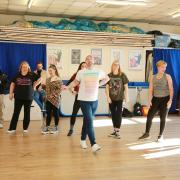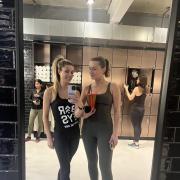If you were thinking of buying someone the present of a pony, what would you be letting yourself in for? We asked a horsey-mad colleague all about it
Danielle Mullen’s day begins at 6am - out of bed and into the car for a 15-minute drive to where her two horses are stabled.
‘I feed them, muck them out, give them a good brush, turn them out in the field, check they have fresh water and check there’s been no injuries overnight,’ says Danielle, an advertising account manager for Cheshire Life who lives in Great Barrow, Chester, and has owned horses since the age of 11.
That morning ritual - keeping 24-year-old Chabade and nine-year-old thoroughbred ex-racehorse He’s Ivor The Driver happy, well-fed and well-groomed - takes 90 minutes to two hours. And there’s another visit to the stables every evening.
‘There are no days off. Whether it’s Christmas, you have a hangover or you are suffering from flu, you still need to drag yourself outside to tend to the horses,’ says Danielle.
The reward comes when Danielle is in the saddle, competing in dressage competitions across Cheshire and North Wales, or just riding for fun.
‘In the summer I try to ride pretty much every day,’ says Danielle, who is also, in her spare time, an equine sports massage therapist. ‘For me it’s a lifestyle; it pretty much defines who I am. I love those horses. If you have a stressful day, you turn up, see the horses and it all fades away. Nothing else matters.’
But aside from the cost in time, horse ownership entails a huge commitment in money. Stabling will cost around £25 per horse per week. There’s bedding to buy - two bales of shavings a week at £8 per bale - winter feed which in the case of Danielle’s horses costs £40 or more a week for haylage and £30 a week for concentrated feed, and then shoeing every five weeks at a cost of £130. Worming every eight weeks costs £18 per horse, and then there are vaccinations.
Being a horse owner full-time also means having full-time responsibility for a half-ton animal which is prone to flight when frightened.
‘Owning a pony is not like going for an hour’s riding lesson every week,’ says Danielle. ‘You’ll realise they have a mind of their own, which is not so obvious when you go for a riding lesson in a controlled environment.’
Thinking of buying a horse?
We asked Janet Lee, a British Horse Society registered intermediate instructor from Little Budworth, for a few pointers.
* Be absolutely sure. This commitment is every day, every week, every month, every year.
* How are you going to care for it? If you want to keep the horse at livery, that will be £100 a week before shoeing and without the horse even being ridden for you.
*Be realistic about what you expect from your horse and about your abilities, or those of your child. The danger is people thinking they are better riders than they really are.
* Don’t be put under pressure to buy. You should go and try a horse at least twice, the second time in the company of someone much more experienced than yourself, such as an instructor.
*Consider buying through a local Pony Club. You’ll be able to speak to people there about the horse.
* Think about size, age and temperament. On the whole, young ponies are more suitable for experienced riders, and older horses can give you a great deal of experience, though you may have to see them through their latter years.
*Be sure you know what’s included with the horse. Is tack part of the deal? If not, that could set you back another £1,000.



























